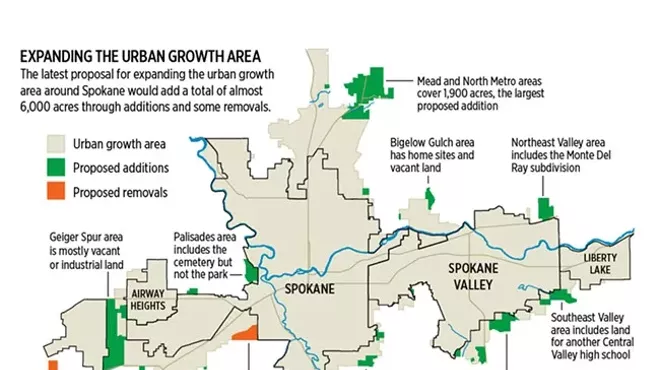Wednesday, April 9, 2014
UGA, Vestment and Sprawl: A video explainer
You can have a tightly-packed city, great for public-transportation, bikes, and pedestrians. You can also have a city sprawled out across miles and miles, a sea of suburbia and endless highway.
Which one you get depends on more than just market forces. It depends on public policy. That's where words like the Urban Growth Area, the Growth Management Hearings Board and "vested" properties begin to crop up.
For the uninitiated, it can all be a bit overwhelming. So we put together this little video explainer to show what it all means and why it's so contentious.
Across the United States, policies like parking lot minimums and height restrictions have made it tough for downtowns to get dense and walkable, while federally funded highways have made it easy for sprawl to grow. And sprawl drives more sprawl. The more sprawl, the harder it is to bike to work or find decent public transportation, and the more necessary it is to have a car. And the more spread out a community is, the worse for the environment and the more expensive it becomes to serve. It’s far cheaper to pay for half the road with twice the traffic as twice the road with half the traffic.
That’s why, in the 90s, Washington state introduced the Growth Management Act, forcing counties to draw an "Urban Growth Area" or "UGA" to designate where dense growth was allowed.
As counties grow, the county can choose to expand that area — as it has repeatedly — but a “Growth Management Hearings Board” can overturn their decisions.
If you’re a developer, and you own some property outside the UGA, you stand to make a lot of money if the border expands to include your property. Suddenly, your property is worth a lot more, because you can build a lot more on it.
But let's say the county expands their Urban Growth Area into your property, but it’s quickly overturned by the Growth Management Hearings Board or a local court. That’s no problem. You just have to be “vested” — a developer term for the legal establishment of a property. If you’re vested, you can still build the dense property, and you still get water and sewer services, even if the expansion’s ruled invalid.
Washington state has one of the loosest vesting laws in the nation: All you have to do is get your predevelopment paperwork approved, and voila, your spot is saved. Think of it like if you could get a restaurant reservation that still allowed you to sit down and be served a meal, even after the Health Department banned all other patrons from entering.
Groups that hate sprawl — like Futurewise and Center for Justice — see that as outrageous. To them, it’s a huge loophole — one that sorta undermines a big part of the state’s growth management strategy.
There have been multiple times that Spokane County has expanded its boundaries, only to have the decision challenged. But the challenges haven’t really mattered: Developers line up, like sprinters in starting blocks, waiting for the UGA to expand so they can get all their paperwork in before the decision is reversed. It’s why there’s dense development in Five Mile Prairie, where the UGA map says there shouldn’t be.
And this time around, when the county expanded the UGA again last year, every study conducted showed that the current UGA was more than big enough to handle decades of growth. But the county commissioners believed there were other specific reasons to expand in each specific area, such as school district needs. So they expanded.
The city wasn’t happy. Environmentalists weren’t happy. And even the governor wasn’t happy. The Growth Management Hearings Board quickly found the expansion invalid — accepting the argument the county violated public participation rules — a bunch of properties have already vested.
Local democrats in the legislature have unsuccessfully tried to get the vesting law changed. So it came down to the city council, which narrowly passed an ordinance to try to stop the use of the so-called loophole: Until the legal challenges to the expansion were resolved, the city would refuse to commit to extending certain water and sewer services to those vested development.
But not so fast. The mayor, under intense lobbying from development groups, vetoed the measure, arguing that it would produce all sorts of uncertainty. Legal uncertainty for the city. Uncertainty for developers. Even uncertainty for land-use advocates. The majority of the council doesn’t buy it.
The mayor says he wants to work intentionally with Commissioners to plan out the city’s growth. But for now, that apparent loophole exists for the foreseeable future.
Tags: News , Urban Growth Area , sprawl , Image , Video
























